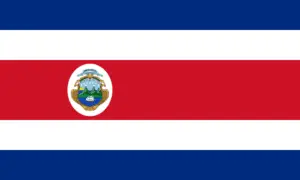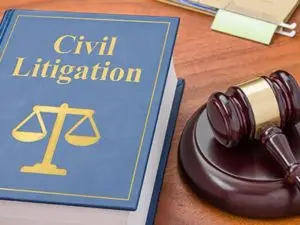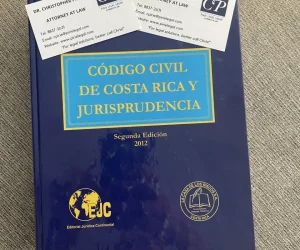About Costa Rica. ☎️ Law and Jurisdiction.
The laws of Costa Rica vary. We have civil laws, family laws, labor, criminal, agrarian laws; you name it! We have all types of Costa Rican laws! However, there is only one jurisdiction. Etymologically, the term comes from the Latin term “Iuris Dicto” or “Ius Dicere.” In layman´s terms, it translates to “the act of saying the law.” Jurisdiction is the power of Judges to resolve cases under the country´s boundaries. It works like this: an impartial judge resolves the legal matter brought by litigation, with a final resolution that produces “res judicata.”
Jurisdiction is the power and duty they have to administer justice. Therefore, jurisdiction in Costa Rica refers to the authority of the Costa Rican judges to hear and decide cases. Jurisdiction is given to judges when they are invested as such, and thus lose jurisdiction when they cease to be Judges. Jurisdiction in Costa Rica is only one: the power that the judges have in this country to administer justice, per the laws in Costa Rica.
Sometimes we are simply refering to "branches" of Costa Rican laws.
Having said this, when you hear lawyers talk about the civil jurisdiction, or the family jurisdiction, or say the criminal or corporate jurisdiction, WE are simply talking about the different branches of laws in Costa Rica. Even though we clearly understand, under the definition, that jurisdiction refers to Judges, specifically to the power they have to resolve cases brought before them. We are not referring to “The Dukes of Hazard” traveling across State lines to other “jurisdictions”, with the police behind them.

Where is Costa Rica located? What can you tell me about it?
Costa Rica is a country in Central America, bordered by Nicaragua to the north, Panama to the southeast, the Pacific Ocean to the west, and the Caribbean Sea to the east. It is known for its diverse ecosystems, including rainforests, beaches, and volcanoes, and its commitment to environmental conservation. The official language is Spanish, and San José is the capital city. Costa Rica is a popular destination for ecotourism and adventure tourism. Our varied ecosystems make investing in hotels and rental properties a good option.
It´s a free country with no army, and we are thankful for that. Our country is a presidential constitutional republic and a democracy, one of the oldest in America. The political stability we cherish is the first reason for investing in Costa Rica real estate. A peaceful nation with secure long-term institutions (such as our court system) are the first reasons for doing business and investing in Costa Rica.
Is Costa Rica a common law country?
Costa Rica is a country in Central America, bordered by Nicaragua to the north, Panama to the southeast, the Pacific Ocean to the west, and the Caribbean Sea to the east. It is known for its diverse ecosystems, including rainforests, beaches, and volcanoes, and its commitment to environmental conservation. The official language is Spanish, and San José is the capital city. Costa Rica is a popular destination for ecotourism and adventure tourism. Our varied ecosystems make investing in hotels and rental properties a good option.
It´s a free country with no army, and we are thankful for that. Our country is a presidential constitutional republic and a democracy, one of the oldest in America. The political stability we cherish is the first reason for investing in Costa Rica real estate. A peaceful nation with secure long-term institutions (such as our court system) are the first reasons for doing business and investing in Costa Rica.
How is the court organized in Costa Rica?
The court system in Costa Rica is divided into three levels: lower courts, appellate courts, and the Supreme Court. The lower courts, or “Juzgados de Primera Instancia”, handle different law jurisdictions such as civil, agrarian, family, and labor cases. The appellate courts, or Tribunales de Apelación, hear appeals from the lower courts. Finally, the Supreme Court is the highest in the country and has the power to final review cases.

What about Courts based in Costa Rica, with international jurisdiction?
It’s worth noting that Costa Rica has also signed international treaties and conventions that give jurisdiction to some courts in Costa Rica to rule over specific cases, such as human rights violations and international commercial disputes. These courts however, are international in nature, and therefore the Jurisdiction these Judges have, fall under a totally different category.
The subject- matter competency of the Costa Rican Courts:
The courts in Costa Rica are specialized per the subject matter they address. As such we have labor courts, civil courts, penal, family and administrative courts, and many more. Even though Judges have Jurisdiction, this does not mean that the civil law judge can resolve matters that are the subject matter of the penal judge.
Even though they both have Jurisdiction (since they are Judges), the civil judge can´t resolve criminal matters, because he lacks specialized “subject-matter competency.” This means, that the civil judge, is competent only to resolve civil matter disputes, in use of his jurisdiction.
Dr. Christopher Pirie Gil.
The diverse branches of laws of Costa Rica:
More branches of laws in Costa Rica:

TRANSIT JURISDICTION

ADMINISTRATIVE LAW BRANCH

CONSTITUTIONAL JURISDICTION

CRIMINAL LAW

Bankruptcy Branch





